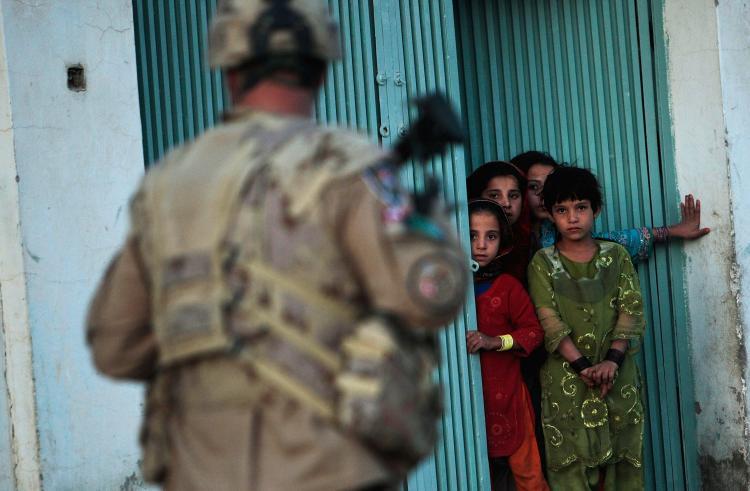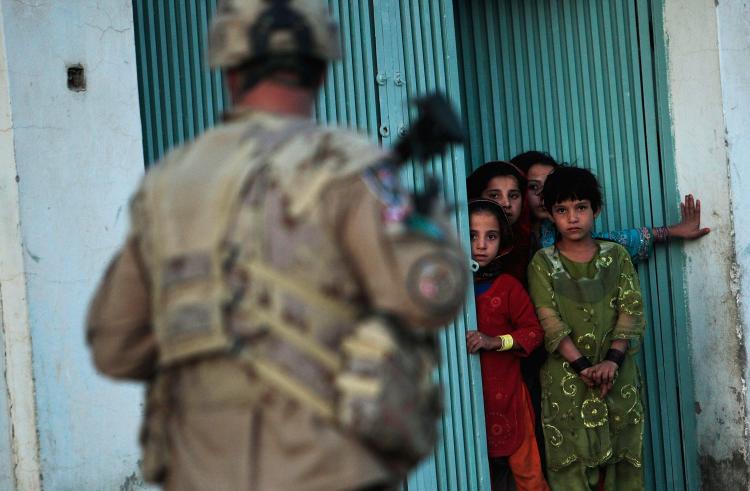A first-of-its-kind study has found that adolescents in military families tend to experience additional stress, isolation, and depression after a parent is deployed to Afghanistan
A team led by University of New Brunswick researcher Deborah Harrison studied students from a high school in Oromco N.B, a town of 9,000 situated around Canadian Forces Base Gagetown, one of the largest military bases in the commonwealth countries.
The researchers found that students from the high school who had a parent deployed to Afghanistan worried about the parent not returning home, or returning home “different.”
The students also felt a sense of added responsibility for the emotional well being of the remaining parent and any younger siblings in the home. Feelings of isolation were common for those whose remaining parent was stressed or preoccupied by the deployment.
Adolescent girls in particular confessed to sharing a large part of the family’s emotional burden during long deployments.
The study also found that the emotional stress does not always end once families are reunited after deployment, particularly if the returning parent is suffering from post traumatic stress disorder.
“We found that family life was almost always negatively affected by an injured parent’s symptoms of anger and depression,” said Dr. Harrison in a release.
“Some adolescents reported needing to go through a process of grieving the loss of their family, as it had been before the deployment. They also reported feeling very isolated, along with their families, by the stigma of non-physical injuries that exists in rank-and-file army culture.”
The Oromco High School findings were part of a larger study on the mental health and well being of adolescents in Canadian Forces families.
What surprised the researchers was that there is virtually no difference between the mental health of adolescents from Canadian Forces families and that of their civilian peers in the same community. In addition, teens from military families have a more positive attitude toward school than their civilian peers.
The release of the study on March 23 was followed by a two day symposium with representatives of the research team and New Brunswick’s school district 17 to examine and discuss the findings and compile a set of recommendations to provide better services for teenagers in Canadian Forces families.
“I am proud of the strategies that our school district school services team has already developed, in an effort to respond to the needs of our students who are touched by the challenges of deployment in the Canadian forces,” said David McTimmony, Superintendant of School District 17.
“Participating in this research project and symposium is allowing us to have a second look at our work and determine where improvements can be made.”
Researchers from UNB, the University of Alberta, Ryerson University, and York University, in partnership with School District 17, conducted the survey, which was funded by the Social Sciences and Humanities Research Center of Canada.
A team led by University of New Brunswick researcher Deborah Harrison studied students from a high school in Oromco N.B, a town of 9,000 situated around Canadian Forces Base Gagetown, one of the largest military bases in the commonwealth countries.
The researchers found that students from the high school who had a parent deployed to Afghanistan worried about the parent not returning home, or returning home “different.”
The students also felt a sense of added responsibility for the emotional well being of the remaining parent and any younger siblings in the home. Feelings of isolation were common for those whose remaining parent was stressed or preoccupied by the deployment.
Adolescent girls in particular confessed to sharing a large part of the family’s emotional burden during long deployments.
The study also found that the emotional stress does not always end once families are reunited after deployment, particularly if the returning parent is suffering from post traumatic stress disorder.
“We found that family life was almost always negatively affected by an injured parent’s symptoms of anger and depression,” said Dr. Harrison in a release.
“Some adolescents reported needing to go through a process of grieving the loss of their family, as it had been before the deployment. They also reported feeling very isolated, along with their families, by the stigma of non-physical injuries that exists in rank-and-file army culture.”
The Oromco High School findings were part of a larger study on the mental health and well being of adolescents in Canadian Forces families.
What surprised the researchers was that there is virtually no difference between the mental health of adolescents from Canadian Forces families and that of their civilian peers in the same community. In addition, teens from military families have a more positive attitude toward school than their civilian peers.
The release of the study on March 23 was followed by a two day symposium with representatives of the research team and New Brunswick’s school district 17 to examine and discuss the findings and compile a set of recommendations to provide better services for teenagers in Canadian Forces families.
“I am proud of the strategies that our school district school services team has already developed, in an effort to respond to the needs of our students who are touched by the challenges of deployment in the Canadian forces,” said David McTimmony, Superintendant of School District 17.
“Participating in this research project and symposium is allowing us to have a second look at our work and determine where improvements can be made.”
Researchers from UNB, the University of Alberta, Ryerson University, and York University, in partnership with School District 17, conducted the survey, which was funded by the Social Sciences and Humanities Research Center of Canada.





